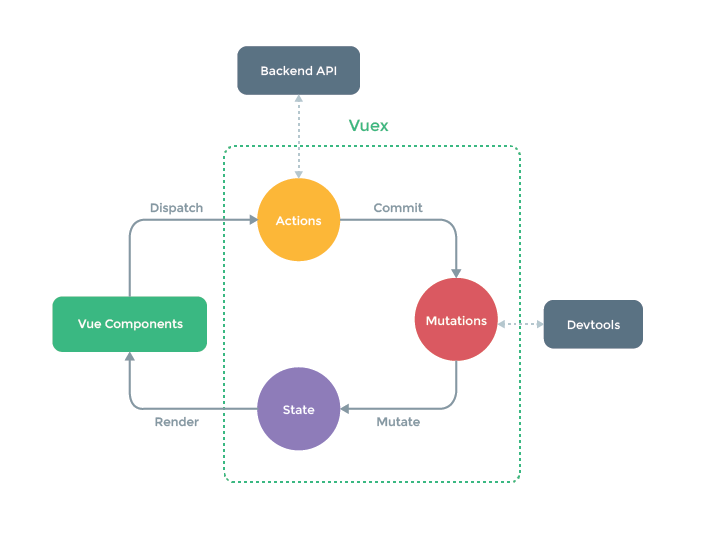之前在项目中有使用过Vuex做状态管理器,但是一直没有了解Vuex的工作原理。鉴于学习一门技术必须掌握其原理的基础,今天我们来探究下Vuex的源码,揭开Vuex神秘的面纱。
我们将仓库克隆到本地:
git clone https://github.com/vuejs/vuex
Vuex源码存放在src目录中,包含以下内容:
- module - Vuex modules 相关内容(暂不做分析)
- plugins - 自带plugin插件
- helper - 包含 mapState,mapMutations等工具类方法
- index.js - Vuex入口文件
- mixins - Vuex初始化操作与Vue 1.x版本兼容性处理
- store.js - Vuex.store相关逻辑
- util.js - 内部工具类
我们先来回顾下Vuex主要流程:
这张图很直观的反映了Vuex的工作流程:
- 视图层触发action(mutation)
- mutation负责修改store状态
- store状态同步到视图层
一个基本的Vuex应该包含以下几个部分:
- 初始化Store类
- 存储和绑定mutations和actions
- 实现dispatch和commit方法
Vuex安装
我们一般使用如下方法安装Vuex:
import Vue from "vue"
import Vuex from "vuex"
Vue.use(Vuex)
new Vue({
store:new Vuex.Store({
...
})
})
Vue提供了Vue.use方法来安装第三方插件,实际内部是通过调用插件对外暴露出来的install来完成的。同样Vuex也提供了install方法:
export function install (_Vue) {
if (Vue && _Vue === Vue) {
if (process.env.NODE_ENV !== 'production') {
console.error(
'[vuex] already installed. Vue.use(Vuex) should be called only once.'
)
}
return
}
Vue = _Vue
applyMixin(Vue)
}
这里使用 _Vue === Vue巧妙的判断了是否之前已经初始过Vuex,之后调用applyMixin函数。applyMixin被定义在了mixin.js中。
export default function (Vue) {
const version = Number(Vue.version.split('.')[0])
if (version >= 2) {
Vue.mixin({ beforeCreate: vuexInit })
} else {
// override init and inject vuex init procedure
// for 1.x backwards compatibility.
const _init = Vue.prototype._init
Vue.prototype._init = function (options = {}) {
options.init = options.init
? [vuexInit].concat(options.init)
: vuexInit
_init.call(this, options)
}
}
/**
* Vuex init hook, injected into each instances init hooks list.
*/
function vuexInit () {
const options = this.$options
// store injection
if (options.store) {
this.$store = typeof options.store === 'function'
? options.store()
: options.store
} else if (options.parent && options.parent.$store) {
this.$store = options.parent.$store
}
}
}
这里首先在内部屏蔽了Vue1.0和2.0的版本差异,对不同版本使用了不同的方法去对每一个Vue实例注册$store对象。在2.0版本中使用了Vue.mixin全局注册混入,在beforeCreate生命周期函数中向this注入了$store对象。这里首先会判断当前组件是否是根组件,如果是根组件则直接注入;如果非根组件,通过options中的parent访问父组件的store引用。这样,我们就可以在所有组件中都获取到同一个引用的 store 对象了。
能访问到$store对象了。
Store类实现
class Store {
constructor(options = {}) {
const {
plugins = [],
strict = false
} = options
// store internal state
this._committing = false
this._actions = Object.create(null)
this._actionSubscribers = []
this._mutations = Object.create(null)
this._wrappedGetters = Object.create(null)
this._modules = new ModuleCollection(options)
this._modulesNamespaceMap = Object.create(null)
this._subscribers = []
this._watcherVM = new Vue()
// bind commit and dispatch to self
const store = this
const { dispatch, commit } = this
this.dispatch = function boundDispatch (type, payload) {
return dispatch.call(store, type, payload)
}
this.commit = function boundCommit (type, payload, options) {
return commit.call(store, type, payload, options)
}
const state = this._modules.root.state
installModule(this, state, [], this._modules.root)
//执行所有plugin
plugins.forEach(plugin => plugin(this))
}
}
}
在Store的构造函数中,新建以下属性:
- _actions
- _mutations
- _actionSubscribers
- _wrappedGetters
- _modules
- _subscribers
- _watcherVM
_actions存储我们实例化Store对象时传入的action_mutation存储我们实例化Store对象时传入的mutation_actionSubscribers中存放外部定义对action的订阅_subscribers中存放外部定义的对mutation的订阅wrappedGetters中定义了外部传入的getter_modules定义了外部传入的modules_watchVM是一个Vue的实例对象,用于对外部传入的getter进行依赖收集
在初始化变量完成后,主要调用了 installModules (初始化module) 和 resetStoreVM (通过Vue使store做到响应式)。
installModule
function installModule (store, rootState, path, module, hot) {
const isRoot = !path.length
const namespace = store._modules.getNamespace(path)
// register in namespace map
if (module.namespaced) {
if (store._modulesNamespaceMap[namespace] && process.env.NODE_ENV !== 'production') {
console.error(`[vuex] duplicate namespace ${namespace} for the namespaced module ${path.join('/')}`)
}
store._modulesNamespaceMap[namespace] = module
}
// set state
if (!isRoot && !hot) {
const parentState = getNestedState(rootState, path.slice(0, -1))
const moduleName = path[path.length - 1]
store._withCommit(() => {
Vue.set(parentState, moduleName, module.state)
})
}
const local = module.context = makeLocalContext(store, namespace, path)
module.forEachMutation((mutation, key) => {
const namespacedType = namespace + key
registerMutation(store, namespacedType, mutation, local)
})
module.forEachAction((action, key) => {
const type = action.root ? key : namespace + key
const handler = action.handler || action
registerAction(store, type, handler, local)
})
module.forEachGetter((getter, key) => {
const namespacedType = namespace + key
registerGetter(store, namespacedType, getter, local)
})
module.forEachChild((child, key) => {
installModule(store, rootState, path.concat(key), child, hot)
})
}
installModule作用是为module加上命名空间后,注册 mutation、action 和 getter,同时递归安装所有子 module。
resetStoreVM
function resetStoreVM (store, state, hot) {
const oldVm = store._vm
// bind store public getters
store.getters = {}
const wrappedGetters = store._wrappedGetters
const computed = {}
forEachValue(wrappedGetters, (fn, key) => {
// use computed to leverage its lazy-caching mechanism
// direct inline function use will lead to closure preserving oldVm.
// using partial to return function with only arguments preserved in closure enviroment.
computed[key] = partial(fn, store)
Object.defineProperty(store.getters, key, {
get: () => store._vm[key],
enumerable: true // for local getters
})
})
// use a Vue instance to store the state tree
// suppress warnings just in case the user has added
// some funky global mixins
const silent = Vue.config.silent
Vue.config.silent = true
store._vm = new Vue({
data: {
$$state: state
},
computed
})
Vue.config.silent = silent
// enable strict mode for new vm
if (store.strict) {
enableStrictMode(store)
}
if (oldVm) {
if (hot) {
// dispatch changes in all subscribed watchers
// to force getter re-evaluation for hot reloading.
store._withCommit(() => {
oldVm._data.$$state = null
})
}
Vue.nextTick(() => oldVm.$destroy())
}
}
这里会先遍历所有 wrappedGetters ,然后将每个元素使用 Object.defineProperty 方法添加 getter,使我们在外部可以使用this.$store.getter.count 这种方式访问 getter。之后 实例化一个Vue对象,利用Vue的响应式做数据更新。
commit
commit (_type, _payload, _options) {
// check object-style commit
const {
type,
payload,
options
} = unifyObjectStyle(_type, _payload, _options)
const mutation = { type, payload }
const entry = this._mutations[type]
if (!entry) {
if (process.env.NODE_ENV !== 'production') {
console.error(`[vuex] unknown mutation type: ${type}`)
}
return
}
this._withCommit(() => {
entry.forEach(function commitIterator (handler) {
handler(payload)
})
})
this._subscribers.forEach(sub => sub(mutation, this.state))
if (
process.env.NODE_ENV !== 'production' &&
options && options.silent
) {
console.warn(
`[vuex] mutation type: ${type}. Silent option has been removed. ` +
'Use the filter functionality in the vue-devtools'
)
}
}
由于commit函数可以传入不同数据格式的参数,所以这里用
unifyObjectStyle将多种传入的数据格式转换成相同的格式去处理。
commit被触发后,在this._mutations中查找对应类型的handlers,找到之后将所有匹配到的handlers执行并且传入payload。在执行handlers前后还会触发一些subscribe中定义的before,after钩子函数,关于subscribe这里我们举个例子:
var myPlugin = store => {
store.subscribe(function (mutation, state) {
// Do something...
})
}
在定义插件的过程中,我们常常需要监听多个mutation,在mutation触发之后做一些公共的操作,比如记录日志之类的,这时候我们就可以使用以上代码来实现。
dispatch
dispatch (_type, _payload) {
// check object-style dispatch
// //处理传入的多种数据格式
const {
type,
payload
} = unifyObjectStyle(_type, _payload)
const action = { type, payload }
const entry = this._actions[type]
if (!entry) {
if (process.env.NODE_ENV !== 'production') {
console.error(`[vuex] unknown action type: ${type}`)
}
return
}
try {
this._actionSubscribers
.filter(sub => sub.before)
.forEach(sub => sub.before(action, this.state))
} catch (e) {
if (process.env.NODE_ENV !== 'production') {
console.warn(`[vuex] error in before action subscribers: `)
console.error(e)
}
}
//查找对应action type的 handler方法,如果找到则批量执行handler方法
const result = entry.length > 1
? Promise.all(entry.map(handler => handler(payload)))
: entry[0](payload)
return result.then(res => {
try {
this._actionSubscribers
.filter(sub => sub.after)
.forEach(sub => sub.after(action, this.state))
} catch (e) {
if (process.env.NODE_ENV !== 'production') {
console.warn(`[vuex] error in after action subscribers: `)
console.error(e)
}
}
return res
})
}
dispatch实现与commit类似,不同的地方在于 dispatch中需要进行异步操作,这里使用 Promise.all 来触发对应action的handler,然后返回Promise。
watch
watch方法的实现使通过实例一个Vue对象,并调用Vue.prototype.$watch做数据变动监听。
this._watcherVM = new Vue()//创建Vue实例
watch (getter, cb, options) {
if (process.env.NODE_ENV !== 'production') {
assert(typeof getter === 'function', `store.watch only accepts a function.`)
}
return this._watcherVM.$watch(() => getter(this.state, this.getters), cb, options)
}
registerMutation
registreMuation的作用是将各个module下面的mutation注册,在 installModule 中会调用此函数。
registerAction
registerAction的作用与registerMutation类似,是把各个module下面的action注册。这里与registerMutation不同的是会判断action执行后返回的是否是Promise对象,如果不是则会将执行结果转换为 resolved状态的Promise对象。
总结
Vuex大概的运行原理已经有所了解,但是其中一些细节的地方待细细研读之后会深入研究。学习Vuex源码的关键就是了解Vuex的运行过程以及应用场景,这样我们在开发过程中就可以随心所欲地使用Vuex了。
以下是参考文章列表:

 随时随地看视频
随时随地看视频




